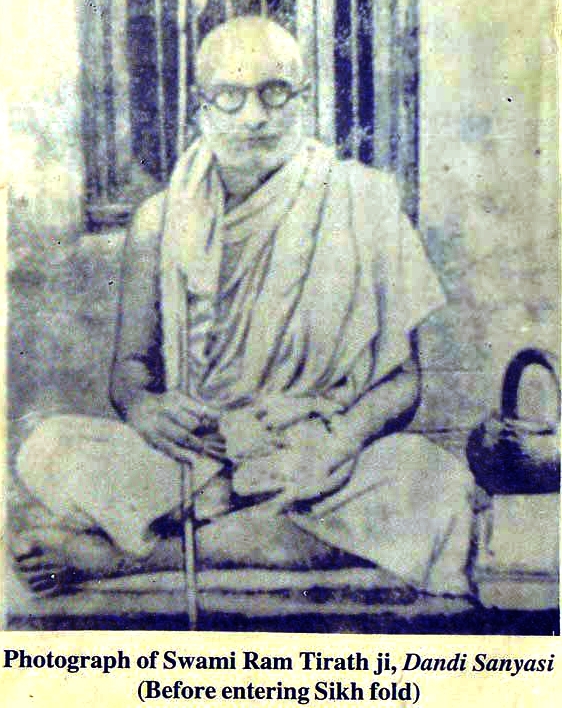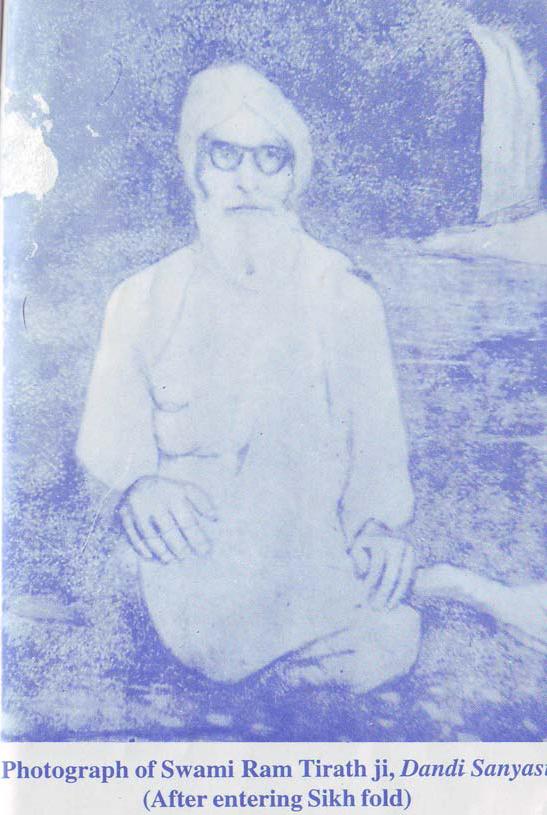Swami Ram Tirath Dandi Sanyasi
Swami Ram Tirath Dandi Sanyasi (aka Ram Tirath Singh)(31 August 1897 - 12 May 1977) was born in Brahmin family at Tohra village in Patiala, Punjab India. He was a Hindu theologian, Sanskrit scholar and an expert in the Vedas, Puranas and Simrities (ancient Hindu scriptures). In his later years, he became the author of the publications "Supreme Scriptures, Sri Guru Granth Sahib" and "Paramount Religion, Khalsa Panth" (both originally written in Hindi; subsequently translated into Punjabi and English).
Biography
Swami Ram Tirath Dandi Sanyasi also known as Dandi Sannyasi (different from Rama Tirtha, Swami), was a recluse who after a prolonged spiritual quest turned to the Guru Granth Sahib. Born on 31 August 1897 to Pundit Balak Ram and Hari Devi, a Gaur Brahman family of the village of Tohra, in the then princely state of Nabha, he received the name of Ram Pratap but was rechristened Swami Ram Tirath by Swami Narayan Tirath, an ex-Principal of Queens College at Calcutta, who initiated him into sannyasi order in 1937.
For his early education. Ram Tirath was apprenticed to a Pandit in Nabha from where he moved to Patiala to study Sanskrit grammar with Pandit Ram Basant Singh, his cousin and a famous Nirmala scholar, who later took him to the Nirmala Akhara at Nankana Sahib, the birthplace of Guru Nanak, and taught him the Sikh texts. When he came of age, he joined the Patiala state army (Risala No. 2) and served for three years.
He then quit the army and travelled extensively, consorting with saints and sadhus. It was during this odyssey that he met Swami Narayan Tirath at Haridwar. During the following four years he traveled through Haryana, Uttar Pradesh and Rajasthan, and it was during this tour that he met a Dandi Sannyasi at Viat Visvesvar Ashram `Aligarh, who taught him Upanisads and Vedant Shastras.
In 1941, he moved into Sonia Temple, at Ludhiana. Now began the most productive period of his life during which he wrote eighteen books and tracts in Sanskrit, Hindi and Punjabi. In Punjabi were his Sarvotam Granth Adi Sri Guru Granth Sahib ( ਸਰਵੋਤਮ ਗਰੰਥ ਆਦਿ ਸਰੀ ਗਰੂ ਗਰੰਥ ਸਾਹਿਬ ) and Sarvotam Dharam Khalsa Panth ( ਸਰਵੋਤਮ ਧਰਮ ਖਾਲਸਾ ਪੰਥ ) the former on Sikh Scripture declaring it to be the supreme religious text and the latter on the Sikhs, followers of this Scripture whom he describes as the very salt of the earth. Swami Ram Tirath died at Haridvar on 12 May 1977 as Ram Tirath Singh.
Excellence of Sikhism, Sarup S. Alag
Swami Ram Tirath was a very famous scholar on Hindu culture and religion. He once studied the Sikh scriptures and was so inspired that he himself became a Sikh. He wrote a book entitled, "Sarvotam Dharam Granth - Siri Guru Granth Sahib te Sarvotam Dharam - Khalsa Panth", meaning the best scripture is Guru Granth Sahib ji and the best religion is the Khalsa Panth. Later in life he got baptised into the Sikh faith.
Embracing Khalsa lifestyle in later age
" After having studied the scriptures, in many respects I have discarded the Vedas, Shastras, Smiritis, all Sutras, Tantras and Puranas, knowing them to be polluted and corrupted by many impurities. I have found that only the Holy Guru Granth Sahib is completely free of contamination and knowing it to be benevolent for the whole humanity, I have accepted this scripture and I accept myself to be the Sikh of Guru Nanak Dev, therefore I am a Sikh of the Guru."
Notable writings of Swami Ram Tirath
Swami ji has written two small books in Hindi:-
- (a) “Sarvuttam Granth – Guru Granth Sahib” ( सरढ़वोतम गढ़रंथ आदि शढ़री गढ़रढ़ गढ़रनढ़थ साहिब|) - (The Best of all Scriptures – Guru
Granth Sahib or Supreme Scriptures, Sri Guru Granth Sahib) and
- (b) “Sarvuttam Panth – Khalsa Panth” (सरढ़वोतम धरढ़म खालसा पंथ|) – (The Best of all Religions – Khalsa
Panth or Paramount Religion, Khalsa Panth).
Both of these booklets have been published in one volume by SGPC (Shromini Gurdawara Prabandhak Committee, Amritsar (in Punjabi). This small book has been translated into English by .
Swami Ji (who later became Khalsa) has given example after example from various Hindu Scriptures testifying that in Hinduism, the Status of Women (per their Holy Scriptures) is outright degrading and even obnoxious. All the scriptures cited by him are ancient, much before the advent of Islam.
from the preface to the Booklet
Swami Ram Tirath, Dandi Sanyasi wrote two monographs, "Sarvotam Dharam Granth Adi Sri Guru Granth Sahib" and "Sarvotam Dharam Khalsa Panth" originally in Hindi. The publications received a very enthusiastic response from readers. Simultaneously there was demand for their translation in other languages. Consequently, the SGPC brought out its Punjabi edition in 1977 combining the two publications in one volume. I am now happy to present the English edition also, which I am sure, will be welcomed by a much wider English knowing audience. The translation has been done by Prof. Malwiner Jit Singh, who retired as Professor of Humanities from Guru Nanak Engineering College, Ludhiana.* I wish to record my sincere appreciation of the commitment and devotion to the cause of Panth, which inspired him to accept this arduous task. Dr Kharak Singh, who supervised the project, also deserves appreciation.......
Introduction by author
A FEW WORDS This writing, Supreme Scripture — Sri Guru Granth Sahib, was got written by Divine dispensation of the Omniscient. After a perusal of our ancient scriptures - Vedas, Simratis, Mahabharata, Tantras, Puranas and Smarat Sutras I came to the realisation that they contained an admixture of ingredients which are intrinsically anti-religious; I have, then, instanced some of them as representative samples and have criticised them.
And, at the end of this writing, I have cited some hymns from Sri Guru Granth Sahib which, besides evidencing their sublime emancipating traits, also establish their fault free nature in juxtaposition to the (other) ancient scriptures. Nowhere I have come across the hymns of the quality matching this one - i.e., of Sri Guru Granth Sahib.
Here I feel obliged to express my gratitude for Pandit Ram Basant Singh ji, who used to preach in Nirmal Sant - Akhara and was later engaged in imparting religious instructions to the children of Maharaja Bhupindra Singh. He belonged to village Tohra and was my first cousin. It was he who took me along to Nanakana Sahib where he got me read Laghu Qaum Di and initiated me into the charm of the Gurus' hymns. That saintly sublime personage is indeed deserving of my hearty gratitude.
To conclude, I venture to submit this writing to you all, assuming that all truth-loving beings would welcome it.
Sincerely yours, Ram Tirath (Dandi Sanyasi) Ludhiana/Hardwar 31st March, 1974
Quote from author:
"Just as the Guru Granth Sahib abated the social injustice, perpetuated against low castes through religious creeds, same way it raised voice in favor of basic rights of the womankind. Here the husband is not said to be the God and the woman the slave or purchased sheep or goat, but (she) has been accepted an equal partner in all (socio-familial) matters. Lopsided dicta of Hindu simirties that vilified women and compelled them to live like captives, was implicitly contravened through Gurus’ Words. Guru Nanak Dev Ji saying that when the whole mankind takes birth from the woman and there is need for woman to perpetuate the life cycle asked, then why the woman is vilified?
In the Adi Granth there is no credo regarding barbaric worship neither any importance for ritual feast (to holy quakes) or sacrifices. Similarly no regard is accorded to Vaishnava or goddess worship because in the puranas it is said that they both (Hindu Goddess and Vishnu, one of Hindu god trinity) relish barbarous intakes i.e. meat, alcohol, marijuana, hemp, tobacco, hashish, cannabis etc.
In the end I want to mention Guru Granth Sahib’s supremacy from the standpoint that this preeminent Granth does not profess any demigod or goddess to be the real God just as the (Hindu) puranas have done. Each purana’s author has made a God out of his conceptual demigod."


